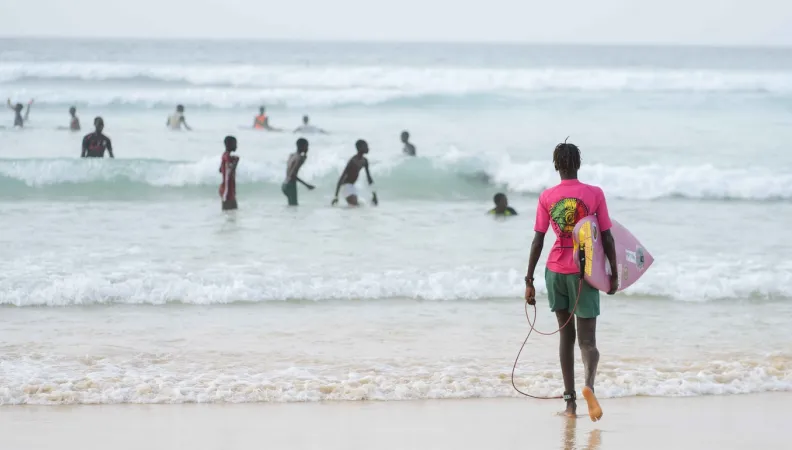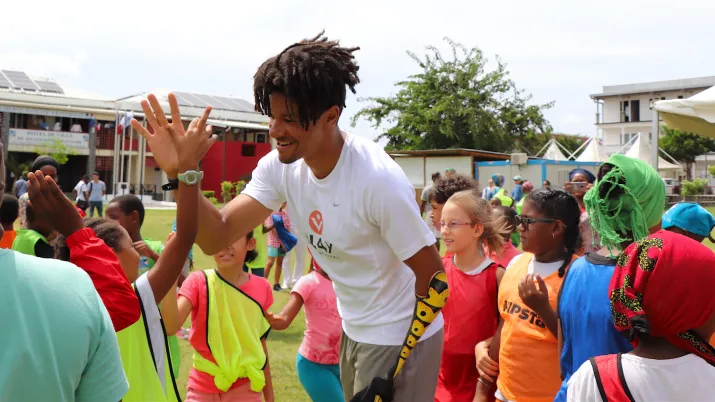Share the page
Sports and Development: the Key to Success
Published on

Since 2012, AFD Group has financed nearly 200 sports projects, supporting more than 80 athletes and reaching around 10 million young people. Recent evaluations of such initiatives confirm that, under the right conditions, sport can have a major social impact.
The “Sports and Development” concept is based on the principle that sport is not just an end in itself, but a lever for driving change in other sectors, such as regards health, education and even gender equality. “Sport is a vector for maximizing the social impact of projects supported by AFD Group,” says Christophe Dias, Sports & Development Advisor at AFD.
The initial findings from these evaluations of the various sport and development projects supported by AFD conclude that sport offers many benefits aside from simply learning physical skills. “It depends on the teaching approach deployed," says Camille Tchounikine, Evaluation Officer at AFD.
The Ejo program, for example, has proven that sport can be a very effective socio-educational tool. Led by the NGO Play International and AFD in Burundi, Senegal, Liberia and Kosovo, Ejo offers an extracurricular program for children that comprises social and sporting activities, while promoting inclusive education through sport. The evaluation of phase 1 of the Ejo program found that these activities help children to develop social and interpersonal skills – particularly among those aged 6 to 13.
“’Playdagogy’ [a play on the words “play” and pedagogy], is an effective tool for improving children’s life skills, in a relevant and reassuring way of changing their mindset," said a school principal in Burundi who was interviewed for the evaluation. Some 80,000 children have taken part in the Ejo program.
See also: Sports & Development Activity Report
Five factors that are key to success
“Sport can have many benefits, but it's not a foregone conclusion,” says Christophe Dias. Targeting an audience based on specific social issues, rather than trying to reach as many young people as possible, was one of the five key success factors identified during the evaluation of the Sports and Development and Impact 2024 International programs, both supported by the European Guild.
Other key success factors for these projects include: offering regular activities over several months, involving community members such as parents and teachers, hiring trainers from the local neighborhood, and finally, ensuring these trainers are sufficiently equipped to deal with educational and inclusion issues.
Giving trainers the right tools
The student/trainer ratio for sports activities has a major impact on the quality of needs analysis and the level of care offered to young people, while support for trainers (teachers, coaches, etc.) is crucial to boost sport's impact on development.
To this end, the two programs supported by the Guild have developed training courses that focus on promoting inclusion in and through sport. For example, 57% of organizations have received training on gender equality, and just over 80% of these have reused this content. The field survey demonstrated the importance of this kind of training, as gender equality in sport and fair play are not enough to bring about lasting change in attitudes and behavior, both on and off the field.
New technologies for impact assessment
Today, work is ongoing within the development community to better measure the social impact of sport. “It’s something that is not being documented enough at present, but it’s important to demonstrate the potential economic, social and environmental impact of sport,” said Christophe Dias at the TechTalk on “Technological Innovation and Sport for a Sustainable Future”.
New assessment technologies have emerged that can measure the impact of these initiatives. In Senegal, the Pour le Sourire d’un Enfant (for a Child’s Smile) association, which helps reintegrate minors into society after detention, has taken this approach with its psychotherapeutic “Fencing and restorative justice” initiative.
The association has been using AI tools to monitor the project’s impact, enabling it to prove that reoffending rates have dropped significantly among the young people supported. This project shows that sport can bring about change in the value systems and behaviors of young people.
Today, AFD continues to develop ideas with its partners, such as Impact Tank, a think tank specialized in assessing the impact of social and environmental innovations, as well as with the coalition of public development banks working on this issue. All these stakeholders have the same objective: to unlock the full potential of sport for development.
Further reading
Beyond the Olympics: Vanquishing Inequality through Sports
Arnaud Assoumani, a Paralympian who will be competing in the Paris 2024 Olympic and Paralympic Games, is at the starting blocks. The long jump and triple jump athlete from the French overseas territor...
Published on August 27, 2024

